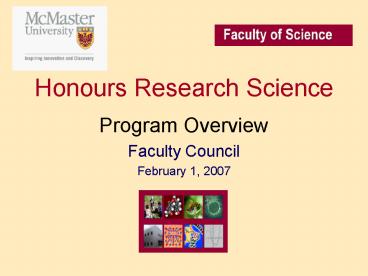Honours Research Science - PowerPoint PPT Presentation
1 / 16
Title:
Honours Research Science
Description:
Honours Research Science. A unique, interdisciplinary, research-based science program ... Recommend broad structure for Honours Research Science program. 2006 ... – PowerPoint PPT presentation
Number of Views:60
Avg rating:3.0/5.0
Title: Honours Research Science
1
Honours Research Science
- Program Overview
- Faculty Council
- February 1, 2007
2
Honours Research Science
- A unique, interdisciplinary, research-based
science program - Targeted toward highly motivated, high achieving
students - 4-year, direct entry program
- Approx. 60 students/year
- Program will focus on
- - Integration of knowledge and skills across
disciplines - - Hands-on research /inquiry experiences
(Level I IV) - - Development of scientific literacy (Level
I IV) - - Both specialist and interdisciplinary
training
3
Progress to date
- Problem
- Diminishing quality of science education for
highly motivated students - Over-emphasis on specialization
- 2005 Dean Capone strikes committee (Chaired
by Bradd Hart) - Explore concept of interdisciplinary,
research-based undergrad program - Recommend broad structure for Honours Research
Science program - 2006 Second committee struck
- Design HRS program and take it through approvals
process
4
HRS program committee(Co-Chaired by Ron Racine
Carolyn Eyles)
- Representatives from all Science
departments/schools, University Librarian,
Faculty of Science staff
5
HRS program structure
HRS 24 units Interdisciplinary Research Science I
6 units electives
- Level I
- Level II
- Level III
- Level IV
HRS 18 units Interdisciplinary Research Science II
12 units Associated discipline electives
HRS 12 units Interdisciplinary Research Science
III
18 units Associated discipline electives
HRS 12 units Interdisciplinary Research Science IV
18 units Associated discipline electives
6
HRS program structure
IRS I (24 units) Fully integrated math, physics,
chemistry, biology, psychology, Earth science and
computing. Themed instructional modules
- Level I
IRS II (18 units) 6 units integrated
math/physics/chem, 6 units integrated
phys/bio/neurosci, 6 units research, modeling,
instrumentation
- Level II
IRS III (12 units) 12 units data analysis,
inquiry/scientific communication leadership
skills, and interdisciplinary team research
project
- Level III
IRS IV (12 units) 12 units interdisciplinary team
research project
- Level IV
7
Program delivery
- Thematic approach
- Delivery matched to content
- Lectures, labs, tutorials, practicum,
fieldwork, skills workshops (e.g. Matlab) - On-line modules, virtual worlds, games,
simulations, blogs, wikis - Inquiry/research
- With faculty - individual and team
- With industry, government, community partners
- internships?
- Team teaching
8
Theme Examples
- Building a Brain
- Topics evolution of brain behaviour,
neurophysiology, motor control, perception and
cognition - Covered by biologists, neuroscientists,
psychologists, physicists, mathematicians,
chemists, computer scientists, kinesiologists,
engineers and economists - Searching for Life on Other Planets
- Topics planets and stars, nature of orbits,
chemical basis for life, necessary conditions,
evolutionary timescales, signal detection, space
flight, sampling for organic traces. - Covered by a broad range of disciplines,
including Earth sciences, physics, mathematics,
biology, chemistry and computer science.
9
Scientific literacy program
- Reading - essays, articles or book chapters
- Address key ideas in the core Science
disciplines as reading assignments - Sample different types of literature
- Differentiate good from bad!
- Writing practice, practice, practice!!
- different forms of writing, peer review, writing
groups, scientific journalism, published products - Wikis, blogs, creative journals
- Ethics, plagiarism
- Feedback - Effective guidance system
10
Level I - transitions
- Level I 24-unit course
- will cover all knowledge/skills required for
entry into Level II Science courses - will be evaluated as series of smaller units
- equivalent to Level I Science courses
- will allow students to transfer out
- required for scholarships etc.
11
Additional features of HRS
- Create first residential program at Mac
- Create seamless Masters transition
- Graduate with MSc in one additional year
- Some Level IV courses count towards MSc
- Create new opportunities for collaboration
- Student-faculty, faculty-faculty
- Create new linkages with local community
- Advisory Board, projects, internships
12
Entry requirements
- 88 average
- 6 Grade 12 courses including
- English U, Functions U
- Two of Biology U, Chemistry U, Physics U,
Calculus U - Preference given to students with both Functions
and Calculus. - Supplementary application
- letters of recommendation, learning style tests,
aptitude tests, series of questions, interviews? - Pre-entry program
- make-up courses review for required background
13
Campus orientation program
- Five day orientation program including
- Introduction to Mac
- Outdoor workshop day
- Library orientation/software/databases
- Ethics/professionalism
- Introduce students to learning styles basic
research tools - Build sense of community
- Mentorship program
- Faculty-student, student-student
14
Program Administration/Resources
- Personnel
- HRS Director
- HRS Administrator
- Secretary
- 2 Teaching Professors ( 2 more), 1 faculty
member/dept/year - Program Advisory Board
- faculty, students, industry/community members
- Space
- Administrative offices, seminar room,
library/work room, lab facilities
15
Start-up dates
- Aiming for September 2008
- Pilot with group of 20 to 30 invited students
- 2009 onwards
- Attract additional high average students
- 60 students per year
- Need approval at UC fall 2007
- Promotional materials need to be created
spring/summer 2007
16
What is so exciting about this program?
- Interdisciplinary focus throughout 4-year program
- Early introduction to scientific research and
inquiry - Development of individual and team research
skills - Development of strong scientific literacy skills
- Opportunities for hands-on/experiential learning
- New instructional methodologies
- It is UNIQUE!































